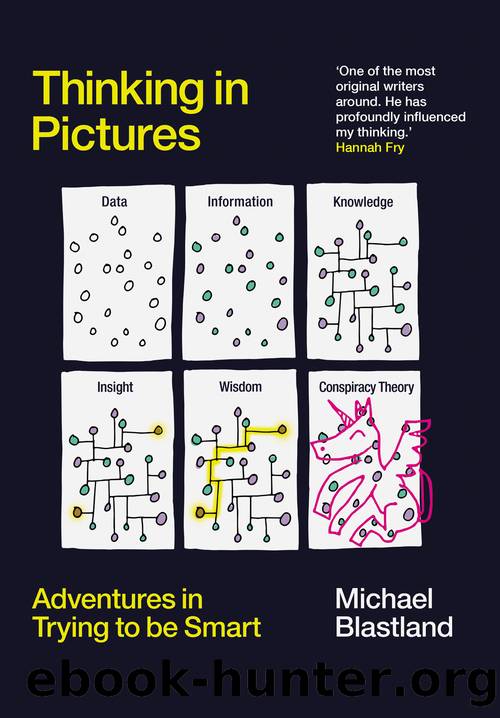Thinking in Pictures by Michael Blastland

Author:Michael Blastland
Language: eng
Format: epub
Publisher: Atlantic Books
Details, details...
All you need do is work out how to change one little thing. Off you go! Spot a lever. Just donât mess with anything else. Looking at this, I almost think that if I do eat the nutri-bollocks wonderfood and it makes sod-all difference â which tends to be the case â I should think myself lucky.
Iâve picked up an annoying habit (only one?): when someone says, âAll we have to do isâ¦â, Rocheâs metabolic pathways come vaguely to mind. In a system, itâs not easy to do âall we need to doâ¦â And after a while you suspect itâs systems, and systems of systems, all the way down â not much that isnât in a web of some kind. âSystems thinkingâ, by the way, is a whole world of books on its own.10 You might think from the way Iâve described it that it makes life hopeless, but itâs not resigned in the face of complexity, and it would be wrong to characterize it as pessimistic. In fact it spends most of its time trying to find rules that govern complexity.
Overleaf, a few more systems: the coast (an ecosystem), snowflakes (every one unique, as you know, formed by complex physical systems), Pumpkin the dog (a system like any creature), a university (a social/educational system), the weather (part of the climate, an environmental system we worry we might have broken), a hospital (one part of a health and social-care system), a town lighting up at dusk (a power-generation and distribution system, among other things), and a few institutions. Is any of these systems less complicated than Rocheâs metabolic pathways?
Iâm vaguely involved with a few of these systems and sometimes wonder: âWhy does it seem so complicated?â With the massive power of my hyper-rational intelligence, Iâve concluded: âMaybe because itâs complicated?â Sure, not all systems are equally elaborate â and how much we want to mess with them also matters. Little answers to little problems in simpler systems tend to bring less kickback than big answers to big problems (see Peter Simsâ book Little Bets, for the case for keeping your meddling small and incremental). We could give Pumpkin the dog a trim without upsetting the rest of her too much. We could change the BBC logo without any material effect on anything, as companies do. We could put a simple new bike chicane in that town there andâ¦
Ach⦠nearly forgot. As we do. Even small tweaks can run into complexity, theyâre just less likely to be the end of the world. Thinking of change in isolation and ignoring all the potential varieties of kickback is another of those intellectual economies because we canât think of everything, but it might leave us looking simple-minded. Secondary and system effects are not the first thing on our mind. Nor should they be, often. But if you act without thinking about them at all, youâre not thinking â youâre wishful thinking.
Since youâre reading this book, you might have come across the Trolley Problem.
Download
This site does not store any files on its server. We only index and link to content provided by other sites. Please contact the content providers to delete copyright contents if any and email us, we'll remove relevant links or contents immediately.
Down the Drain by Julia Fox(965)
The Light We Carry by Michelle Obama(881)
Cher by Cher(789)
Simple Passion by Annie Ernaux(736)
Love, Pamela by Pamela Anderson(594)
Zen Under Fire by Marianne Elliott(557)
The Nazis Knew My Name by Magda Hellinger & Maya Lee(542)
You're That Bitch by Bretman Rock(541)
Novelist as a Vocation by Haruki Murakami(530)
The Foxfire Book of Appalachian Women by Kami Ahrens(518)
Alone Together: Sailing Solo to Hawaii and Beyond by Christian Williams(518)
Kamala Harris by Chidanand Rajghatta(490)
Gambling Man by Lionel Barber(474)
The Barn by Wright Thompson(430)
Drinking Games by Sarah Levy(421)
Limitless by Mallory Weggemann(410)
A Renaissance of Our Own by Rachel E. Cargle(405)
Memoirs of an Indian Woman by Shudha Mazumdar Geraldine Hancock Forbes(403)
A new method to evaluate the dose-effect relationship of a TCM formula Gegen Qinlian Decoction: âFocusâ mode of integrated biomarkers by unknow(396)
